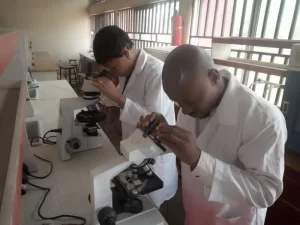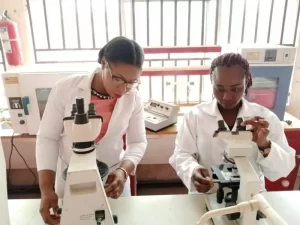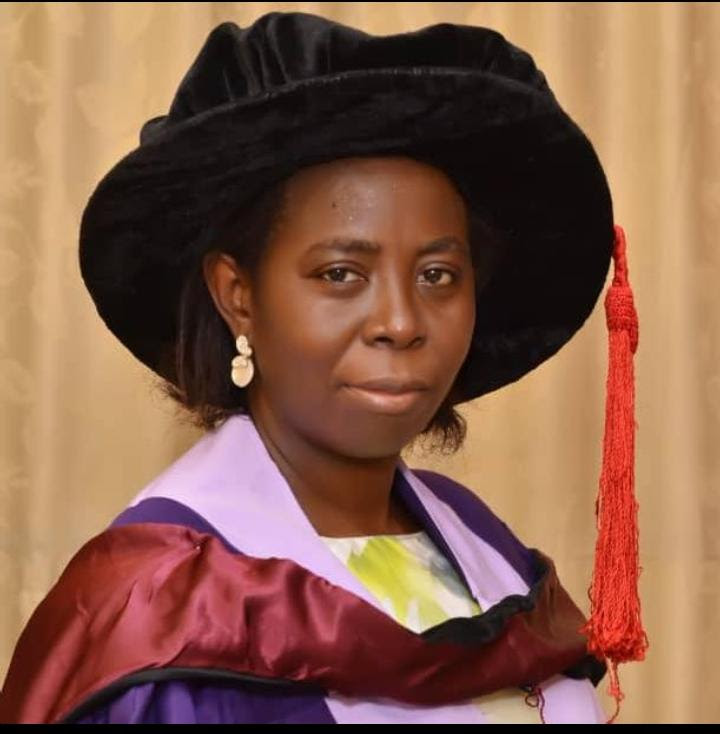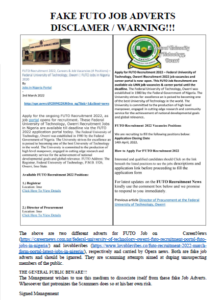The minimum duration of Science Laboratory Technology programmes is five years for candidates who entered by UTME while the maximum of four years and a maximum of six years to graduate provided that they satisfy all the other requirements of the Department. The first-year courses are common to all the programme options. Irrespective of the student’s option, the core departmental courses must be taken by all students of the Department. Each option allows the students within the Science Laboratory Technology professional area.
All students in the programme undergo a three-month Student Industrial Work Experience Scheme (SIWES) during the long vacation of their second year and a six months long vacation industrial attachment in their fourth year of study. Students are usually assessed using the logbook, the report and a seminar. The SIWES is administered through the University SIWES Coordinator, who arranges visits to establishments with students working under the supervision of academic staff explore and apply the knowledge which they have acquired to design and fabricate technological products and many of these projects are centred on industrial needs and problems.
1.1 COURSE CREDIT SYSTEM AND CREDIT UNITS
The course credit system is a quantitative system of organization of the curriculum in which subject areas are broken down into units courses which are examinable and for which students can earn credit(s) if passed. The courses are arranged in progressive order of difficulty or in levels of academic progress e.g. 100 level or year 1 courses are 100, 101 etc. which 200 level or year II courses are 200, 202 etc. The courses are assigned loads known as credit units which consist of a specified number of student-lecturer contact hours per week per semester. The credit units are used in two complementary ways: as a measure of course weighting, and the other, as an indicator of student workload e.g. a 3 – credit unit course may mean a three 1 – hour lectures per week, per semester (3, 0, 0) or two 1 – hour lectures plus one 3 – hour practical per week, per semester (2, 0, 1) or two 1 – hour lectures plus one 1 – hour tutorial per week, per semester (2, 1, 0).
These courses may be a core/compulsory course which every student must compulsorily take and pass in any particular programme at a particular level of study, a required course which a student takes at a level of study and must be passed before graduation, an elective course which a student takes within or outside the school (students may graduate without passing the course provided the minimum credit unit for the programme had been attained), an optional course which a student can take based on interest and may count towards the minimum credit unit required for graduation and the pre-requisite course which a student must take and pass before taking a particular course at a high level.
1.2 COURSE CODES AND CREDIT SYSTEM ADVANTAGES
A course is identified by its code and title and for completeness, course units are assigned to the course. Course code is a combination of three roman alphabets (signifying the subject or options area, e.g. PHY, GST, STC, etc) and a three-digit number (in Arabic numerals, e.g. 101, 201, 301, etc). The first digit represents the level of the course (e.g 1 for 100 level, 2 for 200 level, 3 for 300 level, etc). The second digit represents the special subjects areas in the Department while the third digit represents the semester in which course is given. All courses with odd number third digit course codes are offered in the harmattan semester while courses with even number third digit course codes are given in the rain semester. The course credit system has some advantages which allow the:-
Thematic structuring of the programmes of study i.e. ability to break courses into convenient and manageable modules.
Inter-departmental and inter-disciplinary collaboration in curriculum planning, formation and teaching and minimizes duplication of courses.
Students to move at their own pace within limits.
1.3 STUDENT ACADEMIC ADVISING
An academic adviser is assigned to every year of study to assist the students in their studies through proper guidance and counselling. The adviser ensures that the student’s problems are given attention and keeps full academic records and other relevant information on each student in his/her custody. It is pertinent to note that many students face academic problems when they avoid or ignore their academic adviser and are therefore strongly advised to regularly interact with their academic adviser for a hitch-free programme of study. The other procedures governing the handling of student academic grievances are set out in the University’s Academic Regulations but the Department ensures that these regulations are followed in each case. Generally, students’ grievances passing through the Department are considered by the Departmental Board of Studies before being sent to the Senate through the School Board of Studies with recommendations.
1.4 RULES FOR PARTICIPATING IN EXAMINATIONS
In order to take an examination in any course and obtain a grade, a student is required to;
- register for the course(s) with the departmental course adviser assigned to handle that year of study as well as the department offering the course using the prescribed format.
- attend lectures for at least three-quarters of the lecture periods.
- participate actively in the practicals and projects (if any) and submit assignments.
- be in the hall not later than thirty minutes before the commencement of the examination
In addition, the student must fulfil other University requirements such as the payment of departmental dues, school fees/levies and such other conditions as may be directed by the University. It is the responsibility of the student to know the date, time and venue of any examination in the course(s) which he/she registered and to monitor amendments in the examination time table. The inability of a student to observe these rules may prevent him/her from sitting for an examination.
1.5 EXAMINATION RESULTS
The performance in any semester examination is given by the Grade point average (GPA). The letters A to F as shown in the table below is equivalent to the assigned grade point. However, the grade ‘E’ for scores 40 – 49 will cease to exist with the graduation of those with registration number up to 2013. The percentage scores are based on formal written examination y the student inclusive of tests, assignments and practical work and not mere attendance at lectures or the assessment by the lecturer without examination.
| % Score | Grade | Grade Point Equivalent | Remarks |
| 70 – 100 | A | 5 | Excellent |
| 60 – 69 | B | 4 | Very Good |
| 50 – 59 | C | 3 | Good |
| 45 – 49 | D | 2 | Pass |
| 40 – 44 | E | 1 | Poor Pass |
| 0 – 39 | F | 0 | Failure |
The NUC has again recently released a guideline for a return to a 4point grading system in Nigerian Universities. This becomes operational for students admitted in the 2016/2017 academic session. The grading system is shown in the table below.
| % Score | Grade | Grade Point Equivalent | Remarks |
| 70 – 100 | A | 4 | Excellent |
| 60 – 69 | B | 3 | Very Good |
| 50 – 59 | C | 2 | Good |
| 45 – 49 | D | 1 | Pass |
| 0 – 44 | F | 0 | Fail |
The weighting for a course with the practical component is given as:
Examination – 60%
Tests – 20%
Practical work – 20% Total 100%
The weighting for a course without practical component is given as:
Examination – 70%
Tests – 30% Total 100%
- The minimum pass mark in any examination is 40% (E) for all courses.
- The total grade point for each course is obtained by multiplying the number of units for the course by the grade obtained in that course. If a student scored B in a 4 unit course, A in a 2 unit course and C in a 3 unit course, the grade points are 16, 10 and 9 respectively. The total number of units (TNU) in this case is 9 while the total grade point (TGP) is 35. The grade point average (GPA) is therefore 3.89 and it is obtained by dividing the total grade point (TGP) by the total number of units (TNU) of the courses registered by the student. The cumulative grade point average (CGPA) is obtained by dividing the TGP for the courses taken throughout the programme by all the TNU for the courses offered by the student. It is an indication of the students’ overall performances and gives the class of degree of the student at the end of the programme.
- All degree courses (compulsory, required, elective, optional and pre-requisite courses) undertaken by a student as well as the compulsory participation in the SIWES count towards the evaluation of the class of degree obtained by a student as shown below:
Class of Degree | Cumulative Grade Point Average |
First Class Honours | 4.50 – 5.00 |
Second Class Honours (Upper) 21 | 3.50 – 4.49 |
Second Class Honours(Lower) 22 | 2.40 – 3.49 |
Third Class Honours | 1.50 – 2.39 |
Pass | 1.00 – 1.49 |
Fail | 0.00 – 0.99 |
However, for those admitted in the 2016/2017, the table will change to the table shown below
Class of Degree | Cumulative Grade Point Average |
First Class Honours | 3.50 – 4.00 |
Second Class Honours (Upper) 21 | 3.00 – 3.49 |
Second Class Honours(Lower) 22 | 2.00 – 2.99 |
Third Class Honours | 1.00 – 1.99 |
Fail | Below 1.00 |





